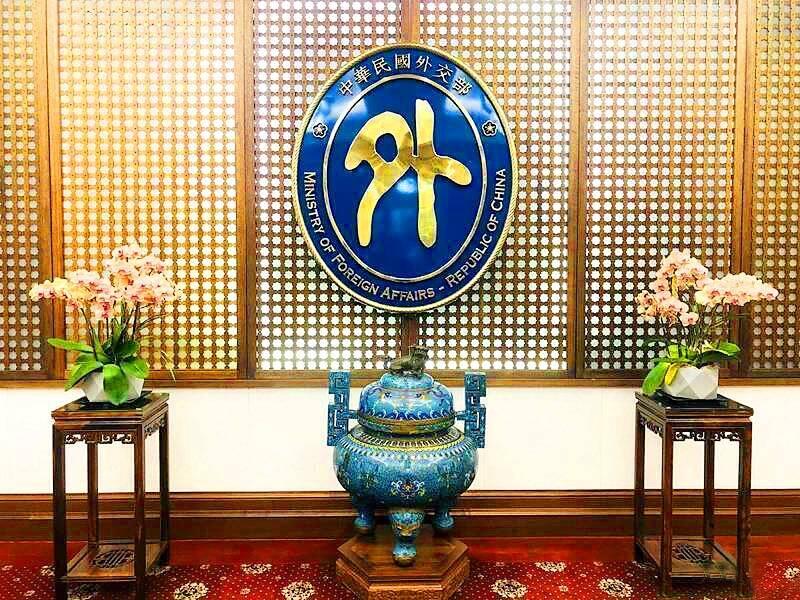The Ministry of Foreign Affairs (MOFA) yesterday played down the attendance of two of Taiwan's diplomatic allies at an international forum in Beijing, which sparked fears of a possible rupture in relations.
The ministry in a statement said it was aware the two allied countries were sending representatives to the forum, as "the governments of our allies informed us of the situation through Taiwan's embassies in advance."

Photo: Taipei Times
It also said that the Forum of China and Community of Latin American and Caribbean States (CELAC) is part of the forum's routine meetings worldwide, and the two officials attended in capacities that did not represent their respective governments.
Taiwan's diplomatic relations with both allies remain strong and stable, MOFA said.
Reuters early yesterday said that its reporters at the Forum of China and CELAC saw the national flags of Haiti and Saint Lucia in the main hall at the venue in the Chinese capital.
Haiti was represented by Minister of Foreign Affairs Jean-Victor Harvel Jean-Baptiste and Saint Lucia by diplomat Peter Lansiquot, although the MOFA statement said that Jean-Baptiste attended as Haiti's CELAC representative, while Lansiquot was representing his political party.
The two Caribbean countries are among 12 states worldwide that recognize Taiwan.
Their presence raised concerns about the future of formal ties, especially given that other members of CELAC with diplomatic relations with Taiwan — Guatemala, Paraguay, Belize, Saint Kitts and Nevis, and Saint Vincent and the Grenadines — did not attend the event.
The timing was also sensitive, coming just more than a week before the first anniversary of President William Lai's (賴清德) inauguration as president Tuesday next week, as Beijing often uses dates near important occasions in Taiwan politics to snatch away Taiwan's allies.
Records show that Haiti (in 2015) and St Lucia (in 2018) have attended at least one of the three CELAC forums in China held in the past, indicating that the presence of allies at the forum is not abnormal.
Taiwan has lost 10 diplomatic allies to China since May 2016 after former president Tsai Ing-wen (蔡英文) of the Democratic Progressive Party took office.
Five of them — Panama, Dominican Republic, El Salvador, Nicaragua and Honduras — were Latin American countries.

Prosecutors in New Taipei City yesterday indicted 31 individuals affiliated with the Chinese Nationalist Party (KMT) for allegedly forging thousands of signatures in recall campaigns targeting three Democratic Progressive Party (DPP) lawmakers. The indictments stem from investigations launched earlier this year after DPP lawmakers Su Chiao-hui (蘇巧慧) and Lee Kuen-cheng (李坤城) filed criminal complaints accusing campaign organizers of submitting false signatures in recall petitions against them. According to the New Taipei District Prosecutors Office, a total of 2,566 forged recall proposal forms in the initial proposer petition were found during the probe. Among those

ECHOVIRUS 11: The rate of enterovirus infections in northern Taiwan increased last week, with a four-year-old girl developing acute flaccid paralysis, the CDC said Two imported cases of chikungunya fever were reported last week, raising the total this year to 13 cases — the most for the same period in 18 years, the Centers for Disease Control (CDC) said yesterday. The two cases were a Taiwanese and a foreign national who both arrived from Indonesia, CDC Epidemic Intelligence Center Deputy Director Lee Chia-lin (李佳琳) said. The 13 cases reported this year are the most for the same period since chikungunya was added to the list of notifiable communicable diseases in October 2007, she said, adding that all the cases this year were imported, including 11 from

China might accelerate its strategic actions toward Taiwan, the South China Sea and across the first island chain, after the US officially entered a military conflict with Iran, as Beijing would perceive Washington as incapable of fighting a two-front war, a military expert said yesterday. The US’ ongoing conflict with Iran is not merely an act of retaliation or a “delaying tactic,” but a strategic military campaign aimed at dismantling Tehran’s nuclear capabilities and reshaping the regional order in the Middle East, said National Defense University distinguished adjunct lecturer Holmes Liao (廖宏祥), former McDonnell Douglas Aerospace representative in Taiwan. If

The Mainland Affairs Council (MAC) today condemned the Chinese Communist Party (CCP) after the Czech officials confirmed that Chinese agents had surveilled Vice President Hsiao Bi-khim (蕭美琴) during her visit to Prague in March last year. Czech Military Intelligence director Petr Bartovsky yesterday said that Chinese operatives had attempted to create the conditions to carry out a demonstrative incident involving Hsiao, going as far as to plan a collision with her car. Hsiao was vice president-elect at the time. The MAC said that it has requested an explanation and demanded a public apology from Beijing. The CCP has repeatedly ignored the desires